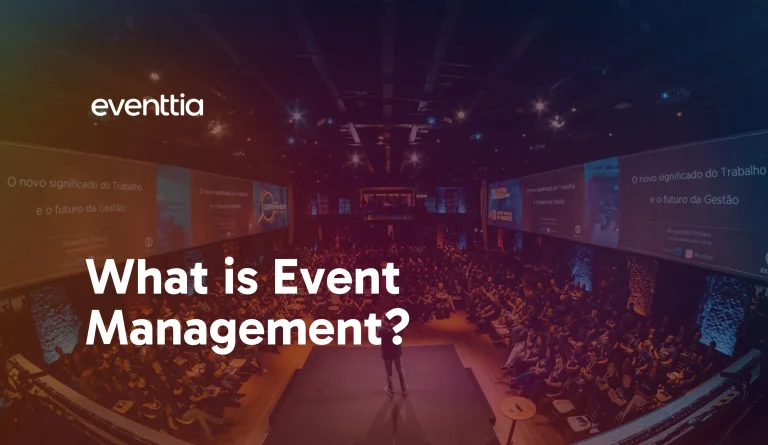What is event management all about? Some people see it as just scheduling and planning, but event management involves crafting experiences that stick with attendees and help an organization meet its goals.
Successful event management is a multifaceted process that includes planning, executing, and overseeing events. This comprehensive approach covers everything—coming up with an idea for the event, organizing all the details, and then measuring how successful it was in the end. These days, the right technology can make each step much easier and less stressful for event planners.
It doesn’t matter if you’re running a consumer event, a corporate gathering, a virtual conference, or a hybrid seminar. Good event management leads to better brand exposure, meaningful connections, and positive takeaways for everyone involved.
In this article, we’ll look at the core parts of event management, share practical ideas for bringing events to life, and explore the newest tech solutions shaping how future events will look and feel.
What is Event Management?
Think of event management as every single detail, from idea generation to wrap-up. The event management process encompasses numerous stages from initial concept design to post-event evaluation. It’s budgeting, scheduling, logistics – and making sure attendees have a good time.
Successful event management relies on managing expenses within a specified budget, maintaining attention to detail, and leveraging technology to ensure smooth execution and a successful outcome.
An event manager plans, coordinates, and keeps everything on track for the host’s goals. Their job is to make sure every piece of the puzzle meets the host’s goals, is on brand, and leaves attendees impressed and inspired. It’s about turning big ideas into real, tangible experiences that people will be talking about long after the event is over.
Which Events Really Need Management?
Have you ever walked into a buzzing consumer event or a lively sports meet and wondered, “Who’s making all this run so smoothly?” That’s where event management steps in. An event management team plays a critical role in ensuring compliance with health and safety standards and legal requirements during events. Lots of different events need a solid plan to succeed, like:
- Consumer and Community Events: Think fashion shows, store grand openings, or local sports days. Ever been part of a store launch that had lines around the block? A well-managed event team is probably why it felt so organized.
- Corporate Events: These include conferences, seminars, and even those fun team-building days you’ve heard about. If you’ve ever sat in a seminar that felt perfectly choreographed—where each speaker was on time and the coffee was always fresh—a great event team was working behind the scenes.
- Exhibitions: Have you ever wandered through a massive art showcase or a huge industry expo where each display seemed to shine on its own? That smooth flow—where installations grab your attention, people move around easily, and speakers come in right on cue—usually owes a lot to a well-organized event management team. They’re the ones who make sure exhibitors have the right setup, visitors know where to go, and everyone’s following essential safety rules.
- B2B Events: These are professional get-togethers aimed at networking and forging new partnerships. If you’ve ever closed a big deal over coffee at a business mixer, you can thank the folks who organized the event for making that meeting possible.
What About Different Event Formats?
Events don’t just come in one shape or size. Here are the main ways people host them:
- In-Person Events: This is your classic gathering—everyone shows up at a venue, listens to speakers, and mingles in hallways. Big consumer expos and many B2B meetups thrive on face-to-face contact.
- Virtual Events: Have you ever attended a webinar while relaxing on your couch? That’s a virtual event. Conferences and workshops are often held online now, letting people join from anywhere in the world.
- Hybrid Events: Picture a big conference hall with a live audience, while remote viewers tune in via livestream. It’s the best of both worlds, especially if you’re aiming for a global crowd without sacrificing an in-person vibe.
Event management technology plays a crucial role in simplifying and enhancing the efficiency of managing these different event formats. It is an essential tool for planners at every stage of the event planning process.
Each event type, whether it’s an in-person fashion show or a global online conference, has its own hurdles. A music festival might require safety plans and crowd control. A corporate seminar might need just the right speakers to keep attendees from dozing off. Event managers handle all of this—coordinating vendor schedules, mapping out safety, and nailing down promotions so guests actually show up.
Now that we’ve looked at the kinds of events where management is key, let’s dig into the steps that make them work. In the next section, we’ll talk about the main stages of event planning—like nailing your event goals, choosing the right venue, and dealing with the inevitable last-minute surprises.
Whether you’re hosting a small workshop or a massive expo, these insights will help you keep everything on track.
Essential Stages of Event Management
1. Ideation and Planning
Ask yourself: What would make this event unforgettable?
Start by getting clear on your goals, budget, and what “success” actually means. Are you trying to educate, entertain, or inspire? Knowing that helps shape every decision afterward.
Experienced event managers play a crucial role in ensuring effective event planning and execution. They manage timelines, coordinate with vendors, and create contingency plans, showcasing their multifaceted responsibilities and the importance of their expertise in achieving successful events.
Imagine hosting a tech meetup for college students who want to learn about AI. Write out your main goal (ex: “Introduce AI basics”), your must-haves (ex: “Budget for snacks, space, and a speaker”), and what would wow attendees (ex: “Hands-on coding demo”).
If you’re using a resource like Eventtia’s Event Planning Checklist, make sure everyone on your team has access, so no one misses a crucial step. You’d be surprised how many events fall apart because a single task slipped through the cracks. Successful event management relies on meticulous planning and attention to detail to ensure everything runs smoothly.
2. Budgeting and Picking Partners
Creating a budget for an event
Your first question should be: How do I avoid bad surprises on my balance sheet?
Break down your event costs early. That includes venue, catering, speakers, marketing, and tech. Don’t forget those sneaky extras like emergency supplies or last-minute add-ons.
Let’s say you decide on a riverside venue for your annual fundraiser. If the forecast says rain, prepare a backup tent rental fee in your budget. Trust me, it’s easier than dealing with drenched guests later.
Peek at our How to Create a Budget for an Event guide if you need a template. It has worksheets, cost calculators, and tips from real event planners.
Choosing Partners: This is also when you finalize sponsors, streaming providers, or the right event technology. A good technology fit can save you hours of headaches. Selecting the right event management software is crucial for optimizing the event planning process. The appropriate tools and integrations can lead to more successful and profitable events. If you’re looking for new software, check out the best event management platform.
3. Event Experience and Logistics
What will attendees remember most? Probably how seamless (or stressful) everything felt. Logistics cover your venue layout, staff coordination, speaker prep, and all those little details that make an event shine.
Event management teams play a crucial role in coordinating logistics and ensuring compliance with regulations, making sure every aspect of the event runs smoothly.
For example, for a themed corporate party, consider how guests will move from the registration area to the main event space. If the path seems confusing, consider adding signs or ushers—a simple fix like that can enhance the overall experience.
Use the Event Planning Checklist in Excel to keep every step in plain sight. It’s a lifesaver when you’re juggling multiple vendors or a big team.
4. Choosing the Right Event Management Software
If you want to simplify your event management, ask yourself: Which tasks actually need automation?
The answer is quite simple: Anything repetitive—like emailing invites, printing badges, or sending schedule updates—can probably be done by software. But make sure it’s user-friendly for you and your attendees.
Example: A nonprofit might need custom donation pages or sponsor placements within their event system. Double-check that the software you choose can handle that smoothly—no sense reinventing the wheel when a built-in feature can do the job.
Choose wisely and go for a provider with responsive customer support. If something breaks at 7 a.m. on event day, you’ll thank them (and yourself) for picking a service that picks up the phone.
Tip: If you’re stuck, read the section “Technology in Event Management” below. It’ll help you see what a good platform can (and should) do.
5. Marketing and Promotion
Now comes the part where you think: How can I get people excited before the big day?
Event promotion plays a crucial role in event management. Various strategies for promoting events include leveraging social media for cost-effective promotion, creating an event webpage, and utilizing speaker promotion to drive attendance.
Basically, try to combine classic marketing (like flyers or local press releases) with digital outreach—event webpages, email lists, social ads, and influencer shoutouts. Tools like Eventtia let you track RSVPs in one place, so you don’t have to deal with ten different spreadsheets.
Automated reminders can bump your attendance rate. Send a friendly heads-up a week before, a day before, and even a few hours before the event starts. People are forgetful—help them remember why they wanted to attend in the first place.
If you’d like to dig deeper into the promotional side of things, don’t miss our “What is Event Marketing: Key Concepts, Proven Strategies, Examples, and Tips” blog article. It’s a useful companion if you want to strengthen your marketing approach and connect with your audience long before they show up at the venue.
Event invitation example powered by Eventtia.
6. Event Execution and On-Site Management
A question you may ask yourself: “How do I keep everything running smoothly on the day?”
Clear communication, real-time analytics, and a quick way for attendees to check in or ask questions. If you’ve got an app that offers QR scanning, Q&A, or live polling, use it! Interactivity keeps people engaged.
Example: At a university alumni event, create live polls during the keynote session. Attendees can vote from their phones, see instant results on a big screen, and feel more connected. Simple to set up, but it leaves a big impression.
Tip: Eventtia’s Event Check-in App helps attendees zip through the entrance, while the Event App shares schedules and speaker info. People love being able to see where they need to be without fumbling with a paper program.
7. Post-Event Analysis and Reports
And last but not least: “How do I know if it was actually successful?”
Crunch the data. Look at attendee satisfaction, engagement rates, ROI—whatever your key metrics are. If you spent $5,000 on marketing but only half your target showed up, you’ll know to rethink your approach next time.
Example: After a product launch, check how many demos were booked at the booth or how many new leads were added to your CRM. That’s the kind of info that tells you if your event sparked genuine interest or just casual browsers.
Tip: Event Tracking Software from Eventtia can pull data on how many people used the live polls, which sessions had the best attendance, or if sponsorship booths drew enough traffic. Hard numbers beat gut feelings when you’re tweaking future events.
Event Analysis and Report example powered by Eventtia.
The Bottom Line
No matter what kind of event you’re hosting, each stage—from planning to post-event analysis—demands care and good communication. Tools like Eventtia streamline a lot of the heavy lifting, but smart strategies and a personal touch will make your event stand out. Ask yourself honest questions, plan for the unexpected, and don’t forget to enjoy the day you worked so hard to create. Successful event management is crucial to achieving the desired outcomes.
Key Metrics and KPIs for Event Success
Ever finished an event and thought, “Wow, that was a ton of work—did it actually pay off?”
Measuring the right numbers can answer that. Let’s talk about three main areas and how they might look in action.
1. Registrations, Ticket Sales, and Attendance
If 500 people sign up, but only 300 show up, that’s useful info. Maybe your date wasn’t ideal or your event reminders didn’t stand out. Some event planners offer last-minute perks—like an exclusive giveaway or a special chat session—to boost attendance from folks who paid but haven’t confirmed.
2. Engagement Levels
Engagement can mean many things: Are people asking questions in Q&A? Are they dropping comments in the chat? Are they filling out polls or surveys?
Higher engagement often signals that attendees are interested in what’s going on. Low engagement might be a clue you need better speakers, more interactive sessions, or maybe just a more lively emcee.
3. Return on Investment (ROI)
ROI isn’t always about ticket revenue. Sometimes, it’s measured in new leads or brand exposure. If your event was free, did you generate a solid list of potential customers or partners?
A well-run event also depends on how smooth things are for your planning team—saved hours and fewer headaches can translate to big wins. Delivering a great attendee experience can turn an average event into a profitable one, even if it’s indirect.
Why Event Management Platforms Matter
Tools like Eventtia provide analytics that shows how many people stuck around for the keynote, how often they participated in breakout rooms, and more. This data can be a gold mine when you’re figuring out what worked—or didn’t.
Understanding your target audience is crucial for tailoring promotional strategies and event content. Identifying and understanding the audience helps in enhancing engagement and ensuring successful event management.
But let’s not forget the human touch: an experienced event manager keeps tasks on track, coordinates vendors, ensures safety, and promotes the event effectively.
Putting It All Together
If you’re wondering what to measure, start with these three core areas. Then, adjust based on what success means for you. If you’re all about revenue, keep an eye on ticket sales. If your goal is brand awareness, maybe track social media mentions or how many attendees share your event hashtag. In the end, the data is there to guide you—so don’t be afraid to dig in, see what it says, and fine-tune your approach for next time.
Technology in Event Management
Event management is going full digital to optimize event planning and the participant experience.
Here are a few of the technologies changing events today:
- Event Management Software: The go-to technology event organizers use to manage all digital aspects of their events, with their team, partners, and attendees. An event management solution with API gives you the flexibility to streamline and integrate with other platforms, to make your event planning process more efficient and connected.
- Event Check-in App and Event Mobile App: One of the most important parts of your role is to enhance the attendee experience before, during, and after your events. To do this you can configure and offer an event app with all the essential information such as event details, attendee QR codes, event program, attendee list, and fun features like a photo booth and social wall.
- Virtual Event Platform: With virtual and physical elements, hybrid events increase accessibility and flexibility for attendees to attend online or in person.
- Artificial Intelligence (AI): AI chatbots can answer attendee questions in real-time so you don’t need constant staff support.
- Augmented Reality (AR) and Virtual Reality (VR): Virtual booths and product demos can be created with AR and VR so attendees can have a more immersive experience.
Event Management example powered by Eventtia.
Event Manager Resources
Having the right resources can make all the difference in planning and executing events. Here are a few to help:
- Event Planning Guide – How to Plan an Event: A full guide that covers everything from idea to execution.
- Event Planning Checklist: Download (Excel file) to make sure every aspect of your events is covered and organized with your team and your event partners.
- Event Project Management Guide: Tools and tips to keep your event on track.
These help you with planning, management, and marketing.
Recent Studies and Research in Event Management for 2025
Have you been wondering where event management is headed in 2025? A bunch of new trends, facts, and figures are shaping this field right now, and it’s good to stay in the loop—whether you’re already knee-deep in events or just starting to explore the idea.
Market Growth and Projections
Some forecasts from Market Research Future indicate that the event management software market may grow from 8.07 billion dollars in 2024 to around 9.09 billion dollars in 2025. That points to a compound annual growth rate of roughly 12.7 percent.
Additional data from Grand View Research suggests it might reach 15.03 billion dollars by 2029, fueled by rising demands for efficient workflows, automation, and better attendee engagement.
Meanwhile, experts at ResearchAndMarkets predict that the event management platform market itself could hit 71.83 billion dollars by 2029, climbing at a rate of about 12.3 percent. Analysts believe this surge is tied to the push for advanced analytics, automated processes, and the popularity of hybrid events.
Key Trends in Event Management
Wondering what’s next for events? As we enter 2025, it’s clear that the industry is all about blending new tech, fresh formats, and smart insights. Below are the trends you should keep in mind if you want your gatherings to shine.
Hybrid Events 2.0
Have you ever thought about hosting one big event across multiple cities—or even continents—at the same time? That’s what the “World Cuisine Festival 2024” did, turning their main celebration into mini-festivals across 50 locations, all linked by live streams and VR.
Meanwhile, the Metropolitan Museum of Art’s “Virtual Tour 2024” gave remote attendees immersive 360-degree tours plus live Q&As with curators. If you’re looking to reach new audiences, a hybrid approach like this might boost your numbers by 40% or more.
AI and Automation
Artificial intelligence isn’t just a buzzword anymore; it can help you personalize everything from networking sessions to recommended talks. The “Global Innovators Expo 2024” matched attendees based on shared interests, boosting meaningful connections by 60%. You could do something similar: imagine a quick quiz at registration that pairs people up or suggests the sessions they’d love most.
And for those looking to speed up check-ins and handle crowd flow, Eventico’s Corporate Summit 2024 used chatbots and face recognition, cutting management costs by nearly a third. Yes, it sounds futuristic, but it’s already happening.
Immersive Technology
Virtual Reality (VR) and Augmented Reality (AR) aren’t just flashy add-ons; they can genuinely keep attendees engaged.
Cannes XR 2024 showcased VR films and AR installations that made the event feel otherworldly. Meanwhile, the EduTech Conference 2024 took a playful spin with an AR-powered scavenger hunt, pushing attendees to explore the venue and engage with exhibitors. That gamified element led to a 35% bump in booth visits.
Cannes XR 2024.
By the Numbers and Looking Ahead
Curious if all this technology is worth it? According to Event Academy in 2024, 62% of planners now see virtual events as a core part of their strategy. Meanwhile, Zion Market Research says the virtual event market could hit $889 billion by 2032.
You don’t have to pivot your whole plan online, but mixing in virtual or hybrid elements could help you tap into that massive growth. Statista also notes that workshops (14.9%) and networking events (14.6%) remain attendee favorites—so think about mixing those into your schedule, whether you’re hosting on-site or online.
By 2025, event planning is poised to be more immersive, data-driven, and eco-conscious. Maybe you’ll let remote attendees “walk through” your venue with AR glasses, or go green by sending out e-tickets instead of printing stacks of paper. Real-time polls and analytics can also tell you which sessions are killing it (and which ones might need a revamp).
Events are changing fast. If you’re ready to stand out, now’s the time to experiment—launch that VR demo, try AI-driven scheduling, or sprinkle gamification into your floor plan. Attendees love experiences that feel fresh, and you’ll love seeing higher engagement and better ROI. Keep an eye on these trends, stay open to new ideas, and you’ll be ready for whatever 2025 has in store.
Case Study: Pierre Fabre – Event Management in the Digital Age
In 2017, Pierre Fabre Group, a world-renowned French pharmaceutical and cosmetics company, was looking to elevate its event management strategy to better accommodate both in-person and virtual audiences.
The company’s events, which include conferences, workshops, product launches, and training sessions, required a sophisticated platform to manage complex logistics and offer engaging experiences to diverse attendees.
By choosing and using Eventtia’s event management platform since then, Pierre Fabre’s MICE team has been able to transform their approach to event management in several key ways:
For Pierre Fabre, Eventtia proved instrumental in elevating their event strategy, making their events more accessible, engaging, and measurable. This case underscores the value of a versatile event management platform that can adapt to both in-person and virtual formats.
Pierre Fabre event powered by Eventtia.
What is Event Management: Key Takeaways
Crafting a successful event—starting with the earliest brainstorms, setting a budget, running everything on the day of, and then following up—goes way beyond simple organization.
You have to understand who’s attending, match your plans to your brand’s goals, and use technology in a smart way to make the experience truly unforgettable. Successful event management relies on key components such as budgeting, teamwork, and attention to detail to ensure smooth execution and a successful outcome.
Sticking to the major steps of event management, tracking the metrics that matter, and watching out for emerging trends (like hybrid formats, AI, or Augmented Reality) helps you create gatherings that not only wow participants but also meet real business objectives. The resources and examples here show that event management is both creative and strategic—combining fresh ideas with practical tools to turn plans into lasting impact.
Ready to discover how a specialized platform can make your entire process simpler? Book a demo with Eventtia to see features like seamless registration, insightful analytics, and attendee engagement tools—all designed to take your events to the next level. Let’s work together to turn your next big idea into a truly memorable experience.
Discover how Eventtia helps world-leading brands digitize and scale their events
Learn moreShare





